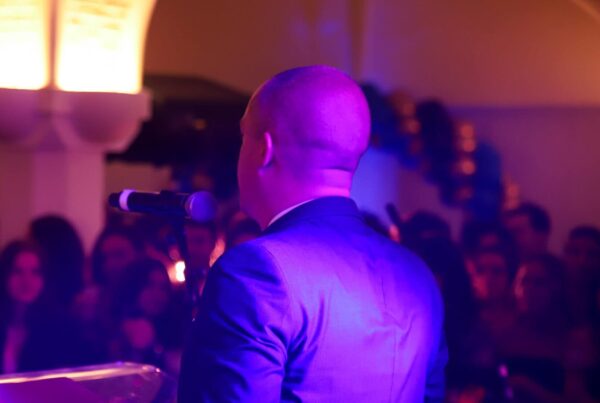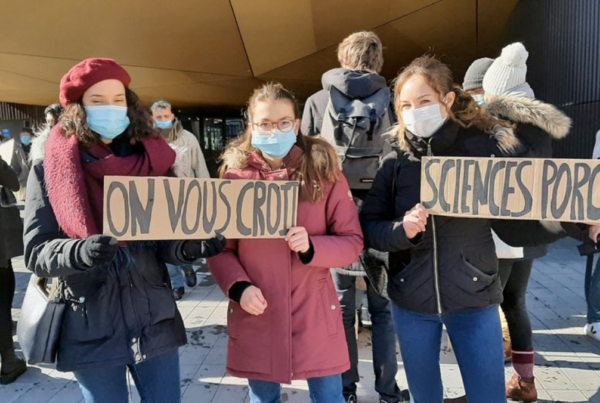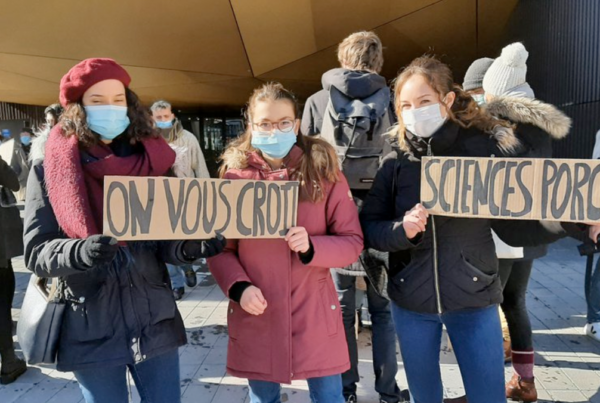By Jacob Hartley and Maria Jose Linares
Following the Act II Reform presentation given on Thursday evening explaining how current first year students will spend their second year, students from the Euro-African program showed their disappointment concerning their program of studies and its future.
The Euro-African program is the most recent addition to Sciences Po’s Undergraduate College and is currently the smallest program in terms of student numbers.
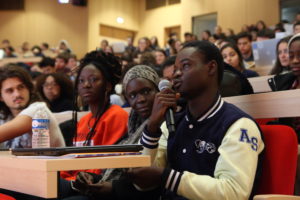
1A Euraf student Romaric Compaore (speaking) explains the Euraf program’s frustrations and questioned Dean Benedicte Durand why more of focus on Africa is not offered for the first year. Photo: Chloé Joubert//The Sundial Press
Prior to the presentation, 1A Euraf student Ali Dilavarhoussen posted statements on two campus-wide Facebook groups asking all 1A Euro-American program students to leave the first few rows for Euraf students, as they wished to show their frustrations with the program in an organized manner.
“We were promised a bilingual program and courses on Africa,” said Dilavarhoussen in a statement to The Sundial Press, “but during this entire year, we won’t have any course talking about Africa except for Winter School, and all our courses are in French.”
For students that came from English-speaking countries in Africa, it has become a problem as they have struggled with understanding the courses and are displeased with not having any courses centered on their regional field of study, Dilavarhoussen said.
“[Some students] did not even choose the Euraf program,” said 1A Euraf Student Representative Loriane Henninot. “All we wanted was to be listened to, and above all to get answers.”
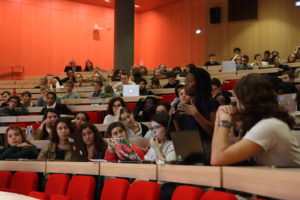
1A Euraf student Iman Eboko (speaking) expresses Euraf concerns regarding the lack of bilingual classes offered to the students during their first year. Photo: Chloé Joubert//The Sundial Press
But the issues and sentiments of Euraf students go beyond their opinion of the reform.
“Many students are discussing leaving the school,” Dilavarhoussen stated. “Some are in a real depression, talking about suicidal thoughts [because] they think that they are losing their time doing something they don’t like.”
Dilavarhoussen noted that this is partly due to homesickness, but of course the feelings of “wasting time” and a lack of direction have lead to resentment of the program. He commented that even the native French students “who came to learn more about Africa” have found themselves “really disappointed.”
The problems surrounding the program have even caused some Euraf students to reconsider attending Sciences Po altogether, with Dilavarhoussen stating that some students want to register to Parcoursup, a government program that helps reorientation students who wish to enter higher education at the start of the 2018 school year have the opportunity to do so.
Thursday evening, Euraf students gathered a few minutes before the presentation began and arranged themselves in the front rows where they would have more visibility.
By the time students were allowed to ask questions, a sign of protest and unity was shown to all of those in the amphitheatre. Olivier Chopin, deputy director of the Reims campus, handed the microphone to several Euraf students who explained their frustrations in front of Dean Benedicte Durand, head of the Science Po’s Undergraduate programs. After lengthy explanations as to why their expectations were not met (consisting of lack of courses that focus solely on Africa, for example).
Durand asked the Euraf students to remain patient, let the reforms take their course, and encouraged students to look ahead to next year when more Africa-centric courses will take place.
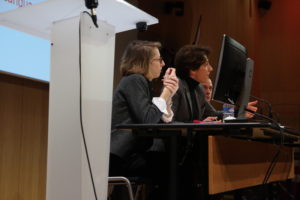
Administration members listen to the student concerns. Pictured from left to right are Academic Advisor Anne-Célia Feutrie, Dean Benedicte Durand, and Director Tilman Turpin. Photo: Chloé Joubert//The Sundial Press
Reactions to the responses from the administration, specifically Durand, among the Euraf students have been mixed.
“Some people regretted the bad ambiance that emerged, some people were angry about the dean’s answers they found very blurred, some had both feelings,” said Henninot. “To be honest, it was a kind of mess.”
“Some students were placed in the Euro-African program even though they didn’t ask for it [are] happy,” Dilavarhoussen said, however “it is a real minority.”
He mentioned that “we may have a bilingual program next year and we may have African courses but nothing is sure and she’s asking us to trust her” and that “after the first semester they (the administration) said the same thing.”
Henninot and Dilavarhoussen both feel that the position of Euraf students is empowered by their actions from Thursday night. Henninot said that “what is sure is that this meeting hasn’t weakened our willingness to be actors of the reform.” Dilavarhoussen also sees hope in the future, but still wants to “see something concrete” instead of verbal commitments from the school.
Going forward, Henninot imagines “that we will have to reorganize our way of action, instauring an healthy dialogue between the admin and us” and that the Euraf program will show “that putting Africa into the core of our courses can’t be anything but a strong asset for Sciences Po.” Dilavarhoussen mentioned that a series of meetings between Reims Campus Director Tilman Turpin and Chopin will take place soon, with the main focus being on the addition of Africa-centric courses taught in English.
Durand was clear in her message on Thursday night stating “if you cannot trust us, I will be very sad, but I will accompany you with your reorientation.” To Dilavarhoussen this translates to “if you are not happy, then ‘bye-bye’.” Henninot hopes to prove to Durand that the Euraf program can move on and progress.
“According to the Dean herself, in this world, you move on or your die,” said Henninot. “We intend to make the Euraf program live.”
Other posts that may interest you:
- The Trouble with ‘Ecocide’
- Carbon dioxide removal – hit or miss?
- Local Victories for Turkish Opposition — A Sign of Hope?
- Are France and Japan a Mismatch Made in Heaven?
- A Reflection on Dark Tourism
Discover more from The Sundial Press
Subscribe to get the latest posts sent to your email.



